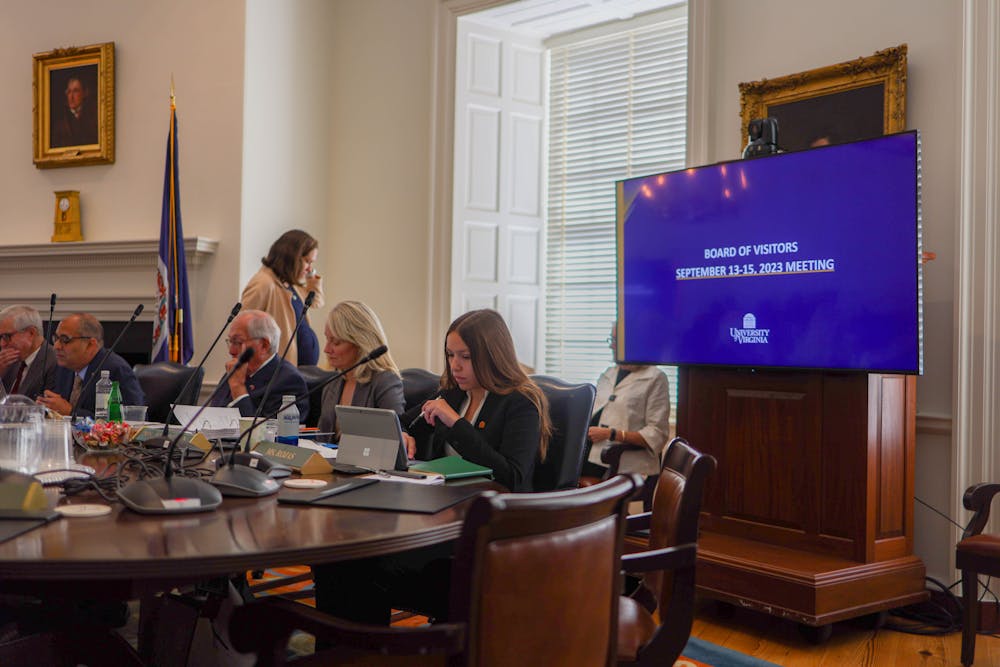Fourth-year Batten student Lillian Rojas boasts an impressive resume. She is a four-year member of the Student Council and sits on the University Democrats executive board. But perhaps her most prestigious title is that of being the sole student member on the University Board of Visitors, the highest governing body on Grounds. There is a catch, however — Rojas cannot vote on any of the Board’s decisions. The unfortunate reality is that Rojas, despite representing the best of what the University’s student body has to offer, cannot use her insight or merit to vote on matters for the Board of Visitors. Per Virginia state law, students on boards of visitors for any public higher education institution may only have nonvoting, advisory roles. As a student of the University, my message is simple — change state law to allow the student member of the Board of Visitors the power to vote in its decisions.
To understand just how counterproductive the student member’s disenfranchisement is, we must first understand the Board itself. Members of the Board are appointed by the Governor of Virginia and confirmed by the Virginia General Assembly to serve four year terms. The Board is the ultimate authority of the University, responsible for its long-term planning and budget. It is also responsible for appointing the president of the University, who is responsible for day-to-day operations. Whether it is creating new scholarships, appointing faculty or making any of the hugely important decisions that fall under their purview, the president ultimately undertakes all of these actions at the behest of the Board. The impact that the Board has on students cannot be overstated — every decision, even at the highest levels of administration, ultimately derives its authority from those seventeen members.
The idea of a voting student representative is not an entirely novel concept. Other institutions have already acknowledged the necessity of hearing directly from students in their highest governing bodies. For example, Penn State University has a voting student member on its Board of Trustees, and expects its Student Trustee to contribute their expertise on student affairs to decision making. Additionally, the University of California Board of Regents also allows student-representatives to have voting rights. Right now, one UCLA graduate student holds the voting position of Student Regent.
In schools as large and wealthy as those in the University of California system and at Penn State, the voting power they grant to their student representatives is admirable and represents a true commitment to hearing the voices of their students. This sets a positive precedent of student representation and connection from which our own University can and should follow.
Without the power to vote, the student member’s opinion is only as valuable as the Board allows it to be. A student member of the Board might be able to effectively lobby the Board into making certain decisions, but they currently have little power apart from lobbying. Granting the student member voting rights would not in any way eliminate the need for the member to work to convince the rest of the Board of the merit of their perspective — in fact, given the majority of non-student Board members, lobbying would remain an integral part of the job. A vote would simply ensure that student’s voices are always at least heard in the final vote.
Consider that the financial policy of the University, including student fees and tuition rates, is decided by the Board’s Finance Committee. These policies are of tremendous consequence to the students who work, earn scholarships and take out loans so that they can foot the bill given to them by the University. Students are investing thousands of dollars and four years of their time into the University — they deserve a say in how their investment is treated. And while these decisions are incredibly complex and involve much more than just what goes on in the north west wing of the Rotunda where the Board convenes, this complexity does not justify disenfranchisement. The student member is involved in all steps of the decision making process — besides the decision itself.
Students clearly deserve a seat at the table, and the lack of voting power neglects the huge responsibility students have always undertaken in service of this institution. The principle of student self-governance has long been the bedrock of the University. Students have always been trusted to play an active role in the decision making processes of the University — a fact in which the administration takes pride. After all, who better than a student to offer insight into what students need? By refusing to have a voting student member on its Board, the University not only renders itself less competent instead of more but also undermines a stated commitment to student self-governance. If the University were truly serious about the promise of student self-governance, they would not shy away from the opportunity to involve student leaders in the decision making processes at the University, even at the highest levels.
With such a rich history of student self-governance, it may seem that students already have other powerful ways of using their voice — ways that eliminate the necessity for a voting student member on the board. For example, students can join the Student Council, which passes resolutions and provides services to the student body. But these resolutions are only suggestions to the University, still subject to the approval of higher governing bodies like the Board of Visitors. It is clear to many students that non-voting positions — and for that matter, any office only extant at the Board’s approval— will by their very nature never be adequate in effectively representing them. Claiming that the options currently available to student leaders are on par with the Board of Visitors is disingenuous.
Within our own institution, students are pushing for this change — the Student Council recently passed a resolution asking Virginia legislators to grant voting rights to the student member of the board. Virginia legislators do not have to look farther than Jefferson to understand why this right is essential — in his earliest conceptions of the University, Jefferson envisioned a place where students are as involved and empowered in their learning process as those teaching them. It is time for the Commonwealth of Virginia to recognize that allowing students voting power on their flagship’s highest governing body is a necessary step towards realizing the founding ideals of the University and towards ensuring that all future student members of the Board of Visitors will genuinely represent the interests of the student body.
Viet Huynh is a Viewpoint Writer who writes about Student Self-Governance for The Cavalier Daily. He can be reached at opinion@cavalierdaily.com.





